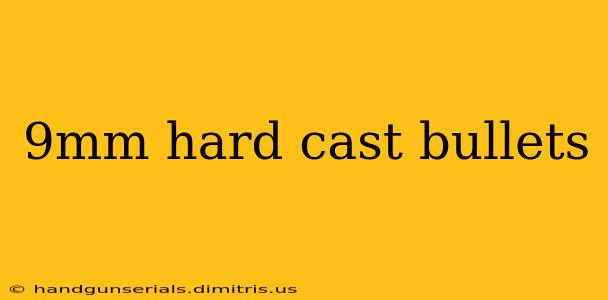Hard cast bullets have earned a solid reputation among shooters, particularly those focused on hunting, target practice, and self-defense. This detailed guide explores the advantages, disadvantages, and considerations surrounding 9mm hard cast bullets. Whether you're a seasoned marksman or a curious newcomer, understanding the nuances of these projectiles will significantly enhance your shooting experience.
Understanding Hard Cast Bullets: Material and Manufacturing
Hard cast bullets, unlike jacketed bullets, are made from a single piece of metal, typically lead alloyed with other metals like tin or antimony. This alloying process increases the hardness and durability of the bullet, making it resistant to deformation during firing and impacting targets. The increased hardness contributes to several key performance characteristics.
Advantages of Hard Cast Bullets
- Superior Penetration: The solid construction of hard cast bullets results in superior penetration compared to their jacketed counterparts. This makes them particularly effective in hunting applications, where deep penetration is crucial for a clean kill.
- Reduced Recoil: Hard cast bullets, due to their generally heavier weight, can sometimes offer slightly reduced recoil compared to lighter jacketed bullets. This can be beneficial for shooters seeking a less jarring shooting experience, especially during extended practice sessions.
- Cost-Effective: Hard cast bullets are often less expensive than jacketed ammunition, making them a budget-friendly option for high-volume shooting. This is especially appealing for target practice and plinking.
- Greater Accuracy in Certain Applications: Many shooters report superior accuracy with hard cast bullets, particularly in revolvers and certain semi-automatic pistols. This is often attributed to the bullet's ability to engage the rifling more effectively.
Disadvantages of Hard Cast Bullets
- Potential for Leading: The softer nature of lead alloys can lead to lead build-up in the barrel of your firearm. Regular cleaning is essential to maintain accuracy and prevent damage to the barrel.
- Not Ideal for High-Velocity Applications: While hard cast bullets can handle higher velocities, they may not perform as optimally as jacketed bullets in very high-velocity applications. The higher pressure could potentially cause deformation or lead to accuracy issues.
- Limited Availability: While increasing in popularity, hard cast bullets might not be as readily available as jacketed ammunition, especially in certain calibers and weight ranges.
Choosing the Right 9mm Hard Cast Bullet: Weight, Alloy, and Design
Selecting the appropriate 9mm hard cast bullet depends largely on its intended use. Factors to consider include:
Bullet Weight:
- Lighter Weights (e.g., 100-115 grains): Often favored for target practice and plinking due to their lower recoil. They may not offer the same penetration as heavier bullets.
- Mid-Range Weights (e.g., 124-147 grains): Provide a balance between penetration, accuracy, and recoil. A popular choice for self-defense and hunting small game.
- Heavier Weights (e.g., 150 grains and above): Ideal for hunting larger game where maximum penetration is required. Recoil can be noticeable.
Bullet Alloy:
Different alloy compositions affect the hardness, density, and overall performance. Higher antimony content usually leads to harder bullets. The specifics of the alloy are often detailed by the manufacturer.
Bullet Design:
The profile of the bullet (round nose, flat nose, hollow point, etc.) significantly impacts its ballistic characteristics. Round nose bullets are generally used for target practice, while hollow points are designed for improved expansion in self-defense situations. Flat nose bullets offer a balance between the two.
Conclusion: Making an Informed Decision
9mm hard cast bullets represent a viable and often cost-effective alternative to jacketed ammunition. Understanding their strengths, weaknesses, and the factors influencing their performance allows you to make an informed choice that aligns perfectly with your shooting needs and the capabilities of your firearm. Always remember to consult your firearm's manual and adhere to safe firearm handling practices. The proper cleaning and maintenance of your firearm are paramount when using lead-based ammunition.

